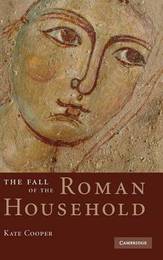
|
The Fall of the Roman Household
Hardback
Main Details
Description
Edward Gibbon laid the fall of the Roman Empire at Christianity's door, suggesting that 'pusillanimous youth preferred the penance of the monastic to the dangers of a military life ... whole legions were buried in these religious sanctuaries'. This surprising study suggests that, far from seeing Christianity as the cause of the fall of the Roman Empire, we should understand the Christianisation of the household as a central Roman survival strategy. By establishing new 'ground rules' for marriage and family life, the Roman Christians of the last century of the Western empire found a way to re-invent the Roman family as a social institution to weather the political, military, and social upheaval of two centuries of invasion and civil war. In doing so, these men and women - both clergy and lay - found themselves changing both what it meant to be Roman, and what it meant to be Christian.
Author Biography
KATE COOPER is Director of the Centre for Late Antiquity and Senior Lecturer in Early Christianity at the University of Manchester. She is the author of The Virgin and the Bride: Idealized Womanhood in Late Antiquity (1996) and editor (with Julia Hillner) of Religion, Dynasty, and Patronage in Early Christian Rome, 300-900 (2007).
Reviews"Kate Cooper's The Fall of the Roman Household is an ambitious and valuable study of the cultural debates among clergy and lay cities regarding the role of marriage and the household in an evolving Christian world. The Fall of the Roman Household is an absorbing and noteworthy study of the aristocratic household at the end of the Western Empire. This thought-provoking text will certainly be of interest not only to those scholars interested in the study of household, family, and gender, but also those interested in more general interplay of classical and Christian ideas in the later Roman Empire. Cooper does a tremendous job bringing together aspects of religious belief with social history to contribute to our understanding of the transformation of the Roman household." --BMCR
|